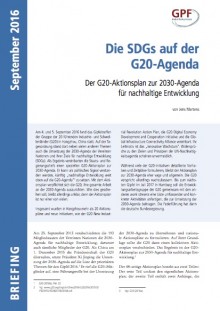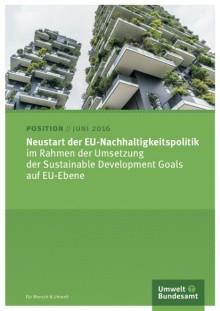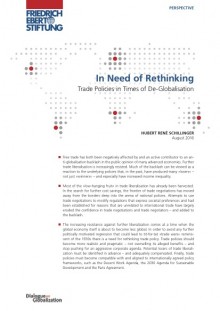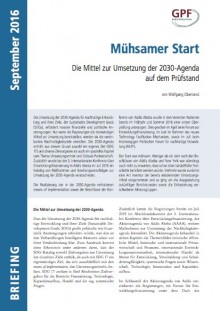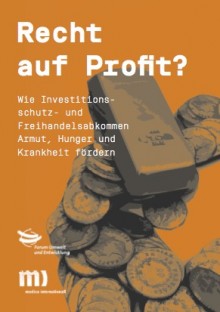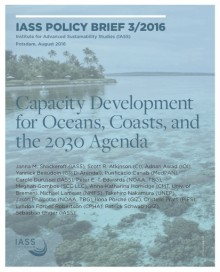Gastbeitrag von Svenja Brunkhorst (Globla Policy Forum)
Alfred-Maurice de Zayas, zur Zeit Sonderberichterstatter der UN für die Förderung einer demokratischen und gerechten internationalen Ordnung, übermittelte jüngst einen Bericht den UN-Menschenrechtsrat. Darin befasst er sich mit der engen Beziehung zwischen Steuersystemen und der Verwirklichung der Menschenrechte. Er weist auf die Herausforderungen von Steuerhinterziehung, Steuerflucht und Gewinnverschiebung durch internationale Unternehmen hin und formuliert Vorschläge, ihnen zu begegnen.
Maßnahmen gegen Steuerbetrug, Steuerhinterziehung und Schattenfinanzzentren sind dringend notwendig, um vertraglichen Verpflichtungen zum Schutz der [...]
UN-Bericht über die Herausforderungen gerechter Steuersysteme
Climate Change Resilience – An Opportunity for Reducing Inequalities
Der G20-Aktionsplan zur 2030-Agenda für nachhaltige Entwicklung
Am 4. und 5. September 2016 fand das Gipfeltreffen der Gruppe der 20 führenden Industrie- und Schwellenländer (G20) in Hangzhou, China statt. Auf der Tagesordnung stand dort neben vielen anderen Themen auch die Umsetzung der 2030-Agenda der Vereinten Nationen und ihrer Ziele für nachhaltige Entwicklung (SDGs). Als Ergebnis vereinbarten die Staats- und Regierungschefs einen speziellen G20-Aktionsplan zur 2030-Agenda. Er kann als politisches Signal verstanden werden, künftig „nachhaltige Entwicklung weit oben auf die G20-Agenda“ zu setzen. Mit dem Aktionsplan verpflichtet sich [...]
Positionspapier des Umweltbundesamts
In einem im Juni 2016 erschienen Positionspapier fordert das Umweltbundesamt (UBA) eine Novellierung der EU-Nachhaltigkeitsstrategie, um die globalen Nachhaltigkeitsziele (Sustainable Development Goals, SDGs) in Ergänzung zur Umsetzung auf nationaler Ebene auch auf Ebene der EU umzusetzen. Das Positionspapier benennt für zwölf Handlungsfelder Zielsetzungen und Maßnahmen für eine nachhaltige Entwicklung in der EU und liefert damit einen Diskussionsbeitrag für einen Neustart der EU-Nachhaltigkeitspolitik.
Expertinnen und Experten des Umweltbundesamtes haben zwölf Handlungsfelder im Zuständigkeitsbereich des UBA identifiziert, die sich auf nachhaltigen Konsum [...]
Trade Policies in Times of De-Globalisation
Die Inter-agency and Expert Group on SDG Indicators (IAEG-SDGs), die Expert/innengruppe, die für die Erarbeitung von Indikatoren für die Umsetzung der SDGs in der UN-Statistikkommission ins Leben gerufen worden ist, lädt zu einer offenen Online-Konsultation zu möglichen Verbesserungen für eben diese Indikatoren.
Zwar steht die Mehrzahl der offiziellen Indikatoren zur Messung der SDGs bereits fest, die Regierungen hatten in der Statistikkommission aber darum gebeten, einige Maßzahlen noch einmal einer Überprüfung zu unterziehen. Die nun stattfindende Konsultation soll der IAEG-SDGs [...]
Von Gabriele Köhler
Man redet und schreibt in deutschen Medien viel über die Flüchtlingskrise. Und in der Tat ist es eine Herausforderung, wenn Jobcenter und Behörden, kleinere Kommunen, oder Arztpraxen jetzt mehr Menschen zu betreuen haben als vor zwei Jahren. In der Tat ist es ein Problem, mit Vorstellungen konfrontiert zu werden, nach denen Frauen nicht gleichberechtigt wären, oder die homophob oder antisemitisch sind. In der Tat können sich Menschen, die ökonomisch und sozial prekär leben, weil ihre Jobs oder [...]
Die Mittel zur Umsetzung der 2030-Agenda auf dem Prüfstand
Die Umsetzung der 2030-Agenda für nachhaltige Entwicklung und ihrer Ziele, der Sustainable Development Goals (SDGs), erfordert massive finanzielle und politische Anstrengungen. Nur wenn die Regierungen die notwendigen Mittel zur Umsetzung bereitstellen, werden sie die vereinbarten Nachhaltigkeitsziele erreichen. Die 2030-Agenda enthält aus diesem Grund sowohl ein eigenes Ziel (SDG 17) und diverse Zielvorgaben als auch ein spezielles Kapitel zum Thema Umsetzungsmittel und Globale Partnerschaft. Zusätzlich wurde bei der 3. Internationalen Konferenz über Entwicklungsfinanzierung in Addis Abeba im Juli 2015 ein Katalog [...]
Wie Investitionsschutz- und Freihandelsabkommen Armut, Hunger und Krankheit fördern
IASS Policy Brief empfiehlt neue Wege beim Schutz der Ozeane
Didaktische Materialien – Medien – Angebote
Im Herbst 2015 haben alle Staaten der Erde „nachhaltige Entwicklungsziele“ (englisch: sustainable development goals – SDGs) beschlossen. Diese beschreiben, was gemeinsam bis 2030 erreicht werden soll: Die Ausrottung von Armut und Hunger und die Verwirklichung einer Lebensweise überall auf der Welt im Einklang mit den ökologischen Grenzen unseres Planeten. Die SDGs sollten in allen Ländern der Erde ein wichtiger Bezugspunkt für politisches Handeln werden. Bedingung dafür ist, die SDGs zu kennen und sich mit ihnen (kritisch) zu beschäftigen [...]
„Die Globalen Nachhaltigkeitsziele der UN und die Einbeziehung von LSBT-Themen“ – so heißt eine neue Veröffentlichung zur Menschenrechtsarbeit im Bereich der sexuellen Orientierung und Geschlechtsidentität. Die Publikation zeigt, was getan werden kann, um mehr Gerechtigkeit für LSBT zu erzielen und wie die Organisationen der Entwicklungszusammenarbeit LSBT in ihre Projekte einbeziehen können. Die Hirschfeld-Eddy-Stiftung hat gemeinsam mit dem Dachverband Regenbogenfamilien Schweiz und der Dreilinden gGmbH das Papier der britischen Organisation Stonewall übersetzen lassen und veröffentlicht.
Alle Menschen mitzunehmen [...]


